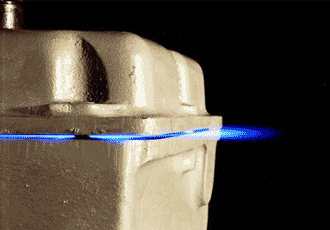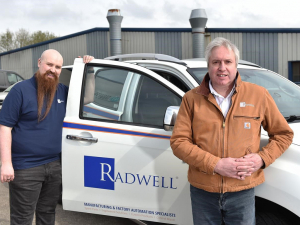Brexit's effects on standards and compliance for hazardous industries

As a member of BSI, IEC, and IECEx standards committees for Explosive Atmospheres and Rotating Electrical Equipment Tim Marks represents the AEMT, and is taking a look at some of the issue facing the Hazardous Area industry now that we know Brexit is going to happen.
There are currently a lot of blank faces, particularly in Whitehall when it comes to the subject of standards, directives, and compliance in the wake of Brexit, but what does it mean for the Hazardous Area industries and will it cause problems for companies doing business in the UK?
The main message here is a sense check; first one needs to understand the difference between standards and Directives:
Technical standards: embody the best practice put together by technical experts to create a uniform engineering or technical criteria. They are becoming more and more international, are not mandatory, and will not be affected by Brexit.
European directives: may have technical input, but emanate from the European Parliament. They must be embodied into the laws of each EU member and are mandatory. The two however are often interlinked and standards can be used to support and help meet European directive requirements.
The European Directives are designed to create a level playing field for trade within the EU. They may also form a technical barrier to goods emanating from outside the EU. They cover all angles of trade, from machinery and transport to eco-design, health and safety.
Hazardous Areas are covered by the ATEX Directives for potentially explosive atmospheres. There are two ATEX directives:
ATEX 95, originally ATEX 94/9/EC, but superseded by ATEX 2014/34/EU on 20th April, 2016.
ATEX 137, workplace directive 99/92/EC covering Health and Safety on site.
There is then the legislation that embodies the ATEX directives into the UK legal system.
DSEAR (The Dangerous Substances and Explosive Atmospheres Regulations).
To a large degree these directives create an invisible barrier to trade with Europe, and are items that will still need to be conformed to after Brexit. Every item manufactured in Europe or manufactured outside the EU for use in an EU zoned hazardous area has to have a valid certificate of compliance to the ATEX directives.
The certificate gives information on the results of testing for compliance with the ATEX directive and named standards, as well as safety issues and labelling details. The certificate is only issued after three samples of each item have been extensively tested in an accredited laboratory by a Notified Body in the EU. This can be a very expensive hurdle for a company wishing to sell its product range into Europe, however, ATEX is no different to the barriers that EU companies meet if they wish to export to the US where they have to meet UL or FM standards, or the Canadian CSA standards, Japan, China, Russia etc.
So what are the top seven problems that may affect the UK Hazardous Area Industry after Brexit?
Will Brexit affect UK manufacturers and importers - who already ensure that their products have the required ATEX certificates?
If the UK continues to ensure that products manufactured, or imported, into the UK, abide by the ATEX Directives, discussions over ease of access to the EU countries by the Customs Union Committee should be more straightforward. The existing ATEX certificates will ensure ease of access into the European market.
Will Brexit affect the users - from international oil and chemical companies to local flourmills?
There would be no advantage in the UK deciding not to comply with the ATEX Directives and many advantages in keeping the status quo. Users of Hazardous area equipment will still specify, buy and conform to the ATEX directives as long as DSEAR in the UK continues to embody the ATEX Directives.
Will the government alter DSEAR if it no longer needs to comply with Europe? DSEAR ensures that everything manufactured or imported to the UK still complies with the European Directive. ATEX works well and is well respected internationally. Its requirement in the UK protects our markets from a flood of non ATEX compliant equipment, and should continue to facilitate the free movement of Hazardous Area Equipment from the UK to Europe, and vice versa.
Will UK companies still be able to manufacture to European standards and Directives?
Standards are becoming more and more international and most of the developed countries are signed into adopting the ISO (International Organisation for Standardisation) or IEC (International Electrotechnical Commission) standards. Both are now based in Switzerland and produce international standards for adoption by member countries. The majority of these are harmonised into the European CEN or CENELEC standards systems, and most EU members are also members of ISO and IEC. Occasionally CEN or CENELEC will produce a standard as a result of a new directive, and this can go the other way and stimulate the production of a corresponding ISO or IEC document. All standards are readily available for anyone or any manufacturer to purchase and comply with.
Will the UK be able to have input into the ATEX Directives?
Fortunately ATEX directives are quite mature now and after 20 years have just had some minor updates. The UK took part in the consultation process and provided technical and procedural input during the review to produce the updated ATEX 2014/34/EU. We may not officially be able to attend future consultations, or have any MEP’s to comment on new directives, however the results of the process and every consultation is available on line. Technical alterations to Directives often encompass alterations to the International Standards, which the UK is well represented on. I am sure that the UK voice would also be heard through international federations and UK international companies with representation in the EU.
Will the UK still be able to have input into the European and International standards?
Generally as these standards become available or go through a maintenance update, they are harmonised into the European standards CEN or Cenelec for IEC electrical standards. These standards are then adopted by EU member states (in the UK they are adopted as a British Standard). Occasionally there will be notes at the beginning of a standard for local requirements, these can be numerous in some countries, but are becoming unusual in the UK. Generally we are very well represented on standards committees, and any problems we foresee in a standard are normally solved at the committee stage. Standards are not a legal requirement, but they normally help manufacturers and users meet their legal obligations. They also create a high standard of best practice for products and create a level playing field for products entering a market and a standardisation of products produced for that market.
Will our notified bodies for Potentially Explosive Atmospheres retain EU notified body status after Brexit?
This is an important issue. The EU has 67 notified bodies in this segment. Eight of them are in the UK, compared to 12 in Germany, ten in Italy, six in Poland, and three in Turkey, other EU members such as France have two, one, or no notified bodies.
Turkey is perhaps the exception that proves the rule, which may help Brexit negotiations. Turkey is not even a member of EFTA, but this decision was issued by the Customs Union Joint Committee in document 2006/654/EC for ‘the elimination of technical barriers to trade in a particular product’ and facilitate the progress of Turkey’s application to join the EU’.
This does ring alarm bells if we have declared that we are leaving the Customs Union. The current UK notified Bodies will require a similar decision from the Customs Union Joint Committee to the one above. The notified bodies in the UK are well respected internationally and have a wealth of technical experience. They do a large amount of business with European and international companies requiring Certificates of Conformity for ATEX to sell their products in the EU. This includes products from America, China, and internationally, as well as those manufactured anywhere within the EU.
Manufacturers not only require new prototypes testing, but continually modify and update their products. If this is to continue in the UK after Brexit, the sooner a Joint Customs Union Committee agreement is reached to clarify the situation, the better.
The UK notified bodies need to be at the front of the negotiation agenda once Brexit is formalised. There are 188 bodies listed by the EU, who can test and issue Certificates of Conformity with directives covering everything from Shipping and Rail to manufactured products, medicines etc. These range from the UK accreditation company UKAS to specialist companies like SGS Baseefa, an AEMT member. These bodies use their specific expertise to test for conformity with every mandatory Directive including ATEX, Machinery Directive, Marine Equipment Directive, Pressure Equipment Directive, Lifts Directive, and Low Voltage Directive. The list is long and covers every area. To facilitate trade agreements with the EU, the UK Government will probably negotiate to abide by most of the directives, such as ATEX.
The 188 bodies involved in testing and accreditation are world class companies employing staff with very specialist technical abilities. Many of them stand on International Standards Committees and facilitate a huge amount of international trade in the oil, chemical and other industries.
It is imperative that the UK Government ensures that Brexit and a split from the Customs Union does not jeopardise the incredibly valuable work that these companies carry out internationally, and ensure that this industry, maintains its leading place on the world class stage.
There are many active groups looking after the interests of the industry, who will continue to communicate with the marketplace about developments and changes, as well as providing sensible advice to government committees. However, now is the time to address these issues.
The mechanisms are in place to continue to ensure compliance doesn’t become any more complex or onerous, and that our ability to do business successfully remains largely unaffected by this particular aspect of Brexit.
Similar articles
More from AEMT (The Association of Electrical and Mechanical Trades)
- Mobile varnish lab is in fast lane to success 9th October 2019
- When it comes to electric motors what is best, new for old? 2nd May 2019
- What is IEC 60034-23 and how does it impact me? 28th January 2019
- Conference examines opportunities created by the Circular Economy 19th November 2018












Write a comment
No comments